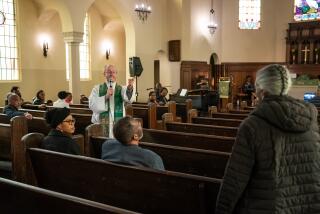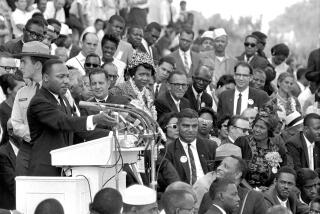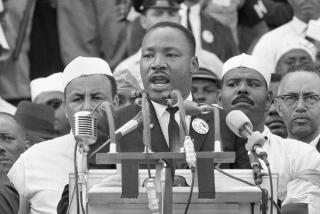Black Leaders Meet Reagan, Seek Alliance : Self-Help Initiatives Urged to Reduce Welfare Dependence
- Share via
WASHINGTON — A group of black community leaders met with President Reagan today in an effort to form “a strategic alliance” aimed at self-help initiatives that would enhance black economic independence.
During a 15-meeting meeting at the White House, the Council for a Black Economic Agenda, citing economic statistics, proposed a series of steps--not unlike those advocated by Reagan in the past to replace dependency on welfare programs with economic development.
Reagan, unable to get a word in during the time reporters were present, finally said, “Those are very interesting figures.”
Council member Dan Smith said after the brief meeting: “What happened today was (that) an initial agenda toward greater black economic independence was presented to the Cabinet. I’m very happy to say it was well received.”
On King’s Birthday The meeting, which coincided with the birthday anniversary of the late Dr. Martin Luther King Jr., signaled a postelection move by Reagan to improve his relations with blacks, who voted almost as bloc against him in November.
Housing and Urban Development Secretary Samuel R. Pierce Jr., the only black in the Reagan Cabinet, said the session showed that Reagan “will push hard to get closer to the black community” during his second term.
“This is going to be an ongoing, continuing process,” Pierce said. “That was not done before.”
Council Chairman Robert Woodson said government and the black community have become caught up in “an alms race” that has resulted in a 25-fold increase in federal aid to assist the poor but continued widespread poverty and deprivation.
Spending Not Enough Parting ways with established black leaders who have branded Reagan’s budget cuts a cause of pain to the poor, Woodson said a mere increase in spending would not benefit the black community. Instead, he said, the emphasis should be on the expansion of business formation and economic development.
“We are deeply concerned that the black community, in order for it to overcome some of its difficulties, must establish a strategic alliance with the Reagan Administration to address some of our problems,” he said.
At the start of their meeting, Woodson told Reagan that one-third of the black community is in danger of becoming a permanent underclass despite 20 years of federal spending.
He ticked off statistics on welfare, housing, mortality rates and crimes, telling the President, “We’re incubating tomorrow’s criminals at public expense.”
More to Read
Sign up for Essential California
The most important California stories and recommendations in your inbox every morning.
You may occasionally receive promotional content from the Los Angeles Times.













